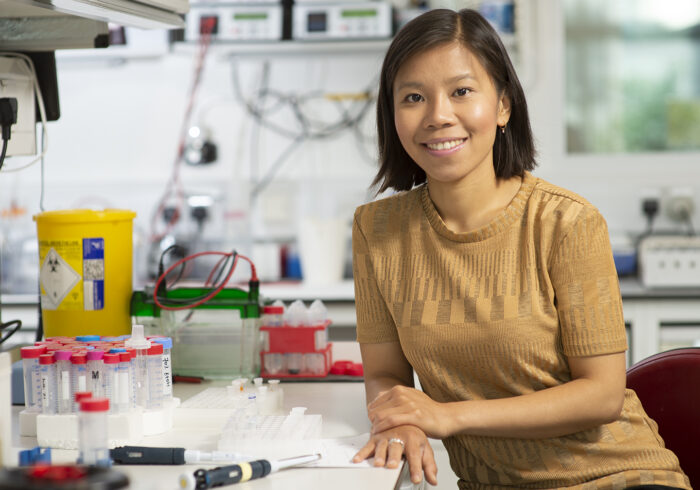
Kelly Nguyen, Group Leader in the LMB’s Structural Studies Division, has been recognised as the 2022 recipient of the Eppendorf Award for Young European Investigators for her PhD and postdoctoral research on the spliceosome, and her more recent research on telomere maintenance and the role of telomeres in human diseases.
The Eppendorf Award for Young European Investigators was established in 1995 and aims to reward outstanding contributions to molecular biomedical research, including analytical concepts. The award is given in partnership with the journal Nature and the recipient must be under the age of 35 and based in Europe.
After earning her Ph.B (honours) degree in Chemistry at the Australian National University, Kelly joined the LMB to complete a PhD in Molecular Biology and a short postdoctoral placement in Kiyoshi Nagai’s group. Her research focused on understanding the spliceosome, a macromolecular machine involved in the maturation of messenger RNAs for protein synthesis. Using electron cryo-microscopy (cryo-EM), Kelly mapped a large part of the spliceosome, revealing for the first time how the protein and RNA components interact with each other to build the molecular machine.
In 2016 Kelly was awarded a Miller Research Fellowship to work on telomerase at the University of California, Berkeley. Following this, Kelly started her group at the LMB in 2019 where she researches the mechanism by which telomeres – protective nucleoproteins which cap the ends of chromosomes in eukaryotic cells – are maintained and also investigates the molecular basis by which the enzyme telomerase rebuilds telomeres which are lost during genome replication.
Kelly’s research has led to significant breakthroughs. Last year her group published the first ever atomic model of human telomerase, determined by cryo-EM. Their examination of the enzyme revealed a previously unknown histone dimer and novel telomerase subunits. In February this year, Kelly published the results of further cryo-EM analysis of telomerase in which her group discovered how the protein shelterin recruits and activates telomerase to extend telomere ends. These insights have significant clinical importance, as telomerase is an important drug target against cancers and ageing diseases.
Her research has previously been recognised by the RNA Society Scaringe Award in 2016, Biochemical Society Early Career Research Award in 2017 and the Suffrage Science Award, curated by the MRC London Institute of Medical Sciences (LMS), in 2020.
“It is a tremendous honour to be recognised by this prestigious award for our contribution to structural understandings of the spliceosome and telomerase. It has really been a team effort every step of the way. Thus I would like to share this honour with my laboratory, past and current colleagues, collaborators, mentors and family, without whom all of this would not have been possible. The award will help keeping the momentum of my laboratory to continue addressing fundamentally important questions in telomere biology,” Kelly commented.
Kelly was honoured at the Eppendorf prize ceremony on 5th July at the EMBL Advanced Training Centre in Heidelberg, Germany, and her work will be highlighted by a Nature podcast and article. Kelly joins the ranks of two other LMB group leaders who previously won the Eppendorf Award; Madeline Lancaster in 2014 and Tanmay Bharat in 2021.
Further references
Kelly’s group page
Eppendorf Award for Young European Investigators 2022 Award Ceremony